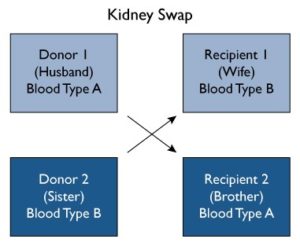Fast Facts about being a Living Kidney Donor
Would a fellow Alaskan benefit from my living kidney donation??
Yes, there are approximately 150 Alaskans waiting for a kidney transplant but in the last ten years, an average of only 30 Alaskans have received a kidney transplant each year.
Who can be a living donor?
If you’re in good health and 18 years or older (even over 70) you may be able to donate a kidney to your child, your spouse, your friend, anybody. Donors do not have to be the same race, age, or sex as the kidney patient.
Oldest Alaskan Living Kidney Donor – Judie was 69 years old when she donated.
Don’t people need 2 kidneys to live?
No. People can live long, healthy lives with only 1 kidney. For donors and recipients, 1 kidney can do most of the work of 2 working kidneys. Over time, the donors remaining kidney will get bigger to do the work of both kidneys.
I want to donate a kidney to my family member or friend. What happens if I don’t match? 
If this happens, you can be ‘matched’ with another pair of folks (donor/recipient) who don’t match either and participate in a paired kidney swap (or exchange). Your friend or family member would get a kidney that is a match for them.
What kind of tests do donors need and where are they done?
A potential donor usually completes a personal questionnaire, most are online. Then there are blood tests which are general done locally.
Who pays for all of the expenses when I donate a kidney?
Usually the kidney recipient’s insurance will pay for most of your general expenses as a donor. Every situation is different and based on insurance and resources available, it is important to discuss the finances with the transplant center this with the transplant center. There are local and national resources available to help cover costs the recipient’s insurance might not cover that will be explained to you when you ‘start the process’.
How long does the donor evaluation process take?
The donor’s evaluation can take several months, depending on the health of the donor and how quickly they can do the tests. The purpose of the evaluation is to make sure that the donor is healthy enough to have surgery and the donation is likely to work.
What is the donor surgery like?
Most living kidney donor surgeries are done laparoscopically. This procedure uses a wand-like camera placed in 2-4 small cuts in the donor’s belly. It lets doctors view the kidney and take it out through a small cut. The doctor will then stitch the cuts closed. Benefits are a shorter hospital stay, shorter recovery time, smaller cuts and fewer problems after surgery.
How long do I have to take off work?
After all the tests are complete and you are approved to be a living kidney donor, the surgery will be scheduled at a convenient time for both recipient and donor. Typically, a living kidney donor spends two days in the hospital, with an additional four to six weeks of recovery time.
Where is the surgery done when I donate a kidney?
Alaska doesn’t have a transplant center – 95% of Alaskans have their transplants at one of the transplant centers in Seattle. Also depends if you are donating to a family member or a friend, the surgery would be done at the transplant center they are registered with.
What happens if I donate a kidney and then my remaining kidney quits working?
“Potential living donors should know that in the rare case where they would later need a transplant themselves, policy gives them very high priority on the kidney waiting list and most prior living donors receive a kidney very quickly.” Jennifer Wainright, of the United Network for Organ Sharing (UNOS).
How do I start the process to see if I can donate a kidney?
If you want to donate to someone you know, your first step is to talk them to find out what transplant center they are registered with. If you want to know more about donating to a fellow Alaskan, please contact the Alaska Kidney Patients Association.
Making the Decision
The decision about being a living kidney donor only happens after all the needed medical tests and conversations have been completed.
What folks who are living kidney donors are saying
Almost 95% of living donors report they would not change anything about their decision to donate.
Nearly 6,000 transplants were made possible in 2016 by living donors!
Next Steps
If you are interested in learning more, the Alaska Kidney Patients Association will be glad to provide you with more information or connect you with a living kidney donor to answer your questions. Contact us by calling 907.333.2257, email kristie@alaskakidney.org or visit our website at www.alaskakidey.org.

I’m in Alaska.I have a dear friend in New Jersey that needs a kidney. My understanding is that my kidney would go to someone in Alaska but by doing a donation in my friends name, my procedure would put my friend on top of a list. If by doing that and it will help TWO people, all the better.
Hi JoJo,
If you are interested in helping your friend, my suggestion would be to ask if you could donate your kidney directly to her. If she has already registered at a transplant center in New Jersey ask her for the name of her transplant coordinator or go online to the transplant center to see if they have any information about being a living kidney donor at their center. As far as I know (and I will do some research), there is no process in place for you to donate a kidney in your friend’s name and she would go to the top of a list.